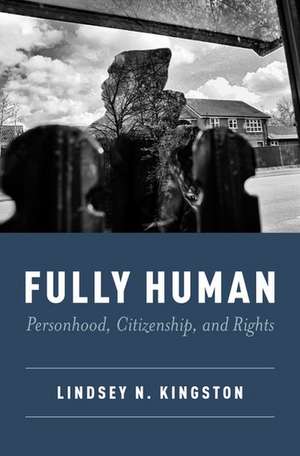Fully Human: Personhood, Citizenship, and Rights
Autor Lindsey N. Kingstonen Limba Engleză Hardback – 2 mai 2019
Preț: 468.48 lei
Preț vechi: 494.25 lei
-5% Nou
Puncte Express: 703
Preț estimativ în valută:
89.69€ • 93.58$ • 75.18£
89.69€ • 93.58$ • 75.18£
Carte tipărită la comandă
Livrare economică 03-08 martie
Preluare comenzi: 021 569.72.76
Specificații
ISBN-13: 9780190918262
ISBN-10: 0190918268
Pagini: 312
Dimensiuni: 236 x 170 x 31 mm
Greutate: 0.54 kg
Editura: Oxford University Press
Colecția OUP USA
Locul publicării:New York, United States
ISBN-10: 0190918268
Pagini: 312
Dimensiuni: 236 x 170 x 31 mm
Greutate: 0.54 kg
Editura: Oxford University Press
Colecția OUP USA
Locul publicării:New York, United States
Recenzii
[E]xciting [and] intellectually innovative.
Kingston makes a valuable and important contribution to the emerging field of statelessness studies. It will not only be interesting for academics in the fields of law, political theory, international relations, sociology, anthropology, or history, but also for practitioners--activists, journalists, lawyers, or migration authorities--and, maybe most importantly, for individuals claiming full and functioning citizenship.
Lindsey Kingston's Fully Human is remarkable both for its breadth of content and its depth of research. Fully Human gives us good reasons to consider the idea of functioning citizenship. What stands out in Fully Human is the blending of empirical evidence and academic theory to produce a motivation for humanitarian action - without didactic moralizing. For those who are interested in human and political rights practices, Fully Human is the right place to start.
This thoughtful and wide-ranging book is an important addition to the literature on citizenship, statelessness, and belonging. It is also a valuable intervention into the increasingly fraught contestation over what states owe to 'outsiders.' Kingston's book and her development of the notion of 'functional citizenship' deserve attention from anyone eager to better understand one of the most egregious human rights challenges of our fraught times.
While there is much written about the distinction between economic and forced migrants, the idea of 'functioning citizenship' is new. Kingston considers several groups which, for reasons of displacement, lack of integration, societal and historic racism and discrimination, cannot call upon the state for protection.In so doing, she draws together several categories of person that are often treated separatelyin international law and in the context of humanitarian protection. Kingston covers a staggering amount of intellectual territory and beautifully pulls together classical works on forced migration, indigenous rights, and liminality with emerging research on statelessness. This book represents an ambitious and original project and will be of great interest to students and scholars of migration, citizenship, and contemporary politics.
Fully Human will be a key reference for anyone interested in the politics of citizenship or human rights. Kingston's conceptions of right to place and purpose, and her argument about hierarchies, provide a substantial and insightful contribution to the theorisation of personhood. This accessible, compelling, and timely book will no doubt make an important contribution to vitally important discussions around humanity and personhood.
Kingston makes a valuable and important contribution to the emerging field of statelessness studies. It will not only be interesting for academics in the fields of law, political theory, international relations, sociology, anthropology, or history, but also for practitioners--activists, journalists, lawyers, or migration authorities--and, maybe most importantly, for individuals claiming full and functioning citizenship.
Lindsey Kingston's Fully Human is remarkable both for its breadth of content and its depth of research. Fully Human gives us good reasons to consider the idea of functioning citizenship. What stands out in Fully Human is the blending of empirical evidence and academic theory to produce a motivation for humanitarian action - without didactic moralizing. For those who are interested in human and political rights practices, Fully Human is the right place to start.
This thoughtful and wide-ranging book is an important addition to the literature on citizenship, statelessness, and belonging. It is also a valuable intervention into the increasingly fraught contestation over what states owe to 'outsiders.' Kingston's book and her development of the notion of 'functional citizenship' deserve attention from anyone eager to better understand one of the most egregious human rights challenges of our fraught times.
While there is much written about the distinction between economic and forced migrants, the idea of 'functioning citizenship' is new. Kingston considers several groups which, for reasons of displacement, lack of integration, societal and historic racism and discrimination, cannot call upon the state for protection.In so doing, she draws together several categories of person that are often treated separatelyin international law and in the context of humanitarian protection. Kingston covers a staggering amount of intellectual territory and beautifully pulls together classical works on forced migration, indigenous rights, and liminality with emerging research on statelessness. This book represents an ambitious and original project and will be of great interest to students and scholars of migration, citizenship, and contemporary politics.
Fully Human will be a key reference for anyone interested in the politics of citizenship or human rights. Kingston's conceptions of right to place and purpose, and her argument about hierarchies, provide a substantial and insightful contribution to the theorisation of personhood. This accessible, compelling, and timely book will no doubt make an important contribution to vitally important discussions around humanity and personhood.
Notă biografică
Lindsey N. Kingston is an Associate Professor of International Human Rights at Webster University, where she directs the Institute for Human Rights and Humanitarian Studies.
